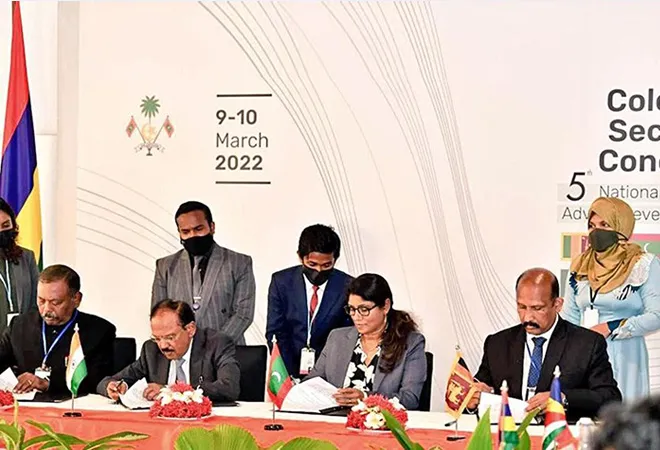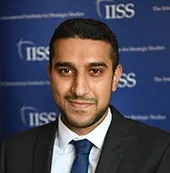 This piece is part of the series, India-Australia Partnership: The Defense Dimension
This piece is part of the series, India-Australia Partnership: The Defense Dimension
As China’s influence and presence in the Indian Ocean grows, India has sought to enhance security cooperation with the Indian Ocean island and littoral nations, through a new ‘minilateral’ group called the Colombo Security Conclave (CSC). Held at the National Security Advisor (NSA)-level, the CSC, which brings together India, Sri Lanka, Maldives, and Mauritius, along with Bangladesh and the Seychelles as observers, is probably now the most active security-focused group operating in the Indian Ocean region.
The CSC’s remit includes maritime security, countering terrorism, and cybersecurity. The small group provides an opportunity for India to address its own strategic concerns in the Indian Ocean while providing an opportunity for the island and littoral nations to address their own challenges. Australia should consider actively participating in the CSC as part of its strategy of enhanced engagement in the Northeast Indian Ocean.
Expanded security focus
The CSC evolved out of trilateral meetings between NSAs and Deputy NSAs from India, Maldives, and Sri Lanka, starting in 2011. India’s somewhat fraught relationship with then-President Abdulla Yameen of Maldives
led to the suspension of meetings between 2014 and 2020.
The small group provides an opportunity for India to address its own strategic concerns in the Indian Ocean while providing an opportunity for the island and littoral nations to address their own challenges.
Since its revival and re-branding as the CSC in 2020, Mauritius was added as a member of the grouping, with Bangladesh and the Seychelles as observers. A
secretariat for the group was established in Colombo in 2021.
Bangladesh and the Seychelles have been invited to join the group and are likely to join as full members. They are already represented in the group by their NSA-level equivalent officials and have participated in the CSC’s security-focused exercises. Although both countries have hesitations over trying to ensure a ‘balanced’ foreign policy approach in relation to China, the benefits of enhanced regional cooperation through CSC membership, will likely outweigh their hesitations.
Due to the varied security challenges faced by the CSC countries, and the need for cooperation, the group’s remit has increased beyond its original maritime security focus. In March 2022, the group adopted an agenda of
five pillars: maritime safety and security; countering terrorism and radicalisation; combating trafficking and transnational organised crime; cybersecurity and protection of critical infrastructure and technology; and humanitarian assistance and disaster relief.
The group has operationalised practical cooperation under the CSC by hosting regular security-focused exercises. Since July 2021, the CSC’s exercises have included on maritime search and rescue; cybersecurity; coastal security; and investigation of terrorism cases. In November 2021, India, Sri Lanka, and Maldives conducted
Exercise Dosti XV in Maldives, with Bangladesh and the Seychelles as observers. India, Sri Lanka, and Maldives subsequently conducted their first joint exercise in the Arabian Sea
under the aegis of the CSC.
In November 2021, India, Sri Lanka, and Maldives conducted Exercise Dosti XV in Maldives, with Bangladesh and the Seychelles as observers.
At the March 2022 NSA-level meeting, Indian NSA Ajit Doval
called for the heads of the coast guards of the four member countries to meet, and for joint working groups on drug trafficking and transnational organised crimes. He also stated that the CSC should have a ‘concrete roadmap’, with a ‘defined charter of objectives’ to institutionalise cooperation.
Challenges
The CSC will need to address several key challenges to enhance its impact. First, if the CSC does expand its membership, it should not duplicate the work of the other Indian Ocean region multilateral groups. The effectiveness of the CSC’s limited membership and scope has been demonstrated in the regularity of the CSC’s dialogues at the NSA and Deputy NSA-level, along with security-focused exercises.
The CSC countries are all members of the two region-wide Indian Ocean groupings, the Indian Ocean Rim Association (IORA), and the Indian Ocean Naval Symposium (IONS). However, the lack of coordination between the IORA and the IONS has hindered the effective functioning of these institutions. To encourage coordination, the CSC could include the rotating country Chairs of IORA and IONS, as observers.
Second, the group will be vulnerable to domestic political changes unless it can better institutionalise itself within the participant’s systems. The CSC should seek to insulate itself from the impact of changes in governments through, for example, establishing working groups at the senior official level.
The CSC countries are all members of the two region-wide Indian Ocean groupings, the Indian Ocean Rim Association (IORA), and the Indian Ocean Naval Symposium (IONS).
Third, with the CSC subsuming the former India-Sri Lanka-Maldives maritime security dialogue, India does not currently hold a regular and dedicated bilateral maritime security dialogue with any of the other five CSC countries. Therefore, to ensure a focus on shared maritime concerns in the CSC, India could establish bilateral maritime security dialogues with each of the island and littoral nations, to complement the CSC process.
Role for Australia
Another challenge is India’s dominant role in the grouping, which creates sensitivities among some members who do not want the group to be viewed as anti-China, limiting the willingness of the group’s smaller nations to cooperate on sensitive security issues. These concerns could be mitigated by other participants hosting exercises on specific issues that India previously led.
As the group becomes more ambitious, member countries have highlighted the
benefits of expanding the participation of like-minded countries. The CSC could expand its number of observer countries to include other Indian Ocean countries, including Australia.
Australia’s experience and expertise on the CSC’s five pillars would likely be welcomed by the CSC countries, including India.
Australia could, for example, supplement India’s efforts by working through the CSC to provide training to CSC members and through hosting security-focused exercises. Australia could also work with the CSC on a specific issue-basis to enhance capacity-building within the Indian Ocean island and littoral nations. Australia’s experience and expertise on the CSC’s five pillars would likely be welcomed by the CSC countries, including India.
Following the Australian government’s February 2022 announcement on enhancing engagement in the
Northeast Indian Ocean, Australia has been focusing on how it can best cooperate with that region. Support for the CSC could be one way of doing that.
This article was written as part of the Australia India Institute’s Defence Program undertaken with the support of the Australian Department of Defence. All views expressed in this article are those of the author only.
Viraj Solanki is the Research Associate for South and Central Asian Defence, Strategy and Diplomacy at the International Institute for Strategic Studies (IISS), based in London.
The views expressed above belong to the author(s). ORF research and analyses now available on Telegram! Click here to access our curated content — blogs, longforms and interviews.



 This piece is part of the series,
This piece is part of the series,  PREV
PREV


